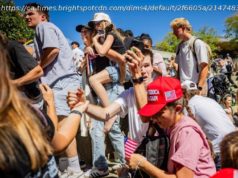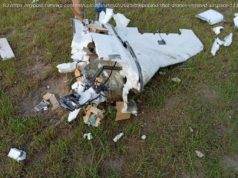President Donald Trump on Wednesday told reporters his administration could send between 10,000 to 15,000 troops to the Southwest border.
Oct. 31 (UPI) — President Donald Trump on Wednesday told reporters his administration could send between 10,000 to 15,000 troops to the Southwest border, echoing Pentagon comments Tuesday that the Defense Department expects to send more than the 5,200 deployed this week.
Speaking to reporters outside the White House, Trump denied suggestions that the administration is using «fear mongering» to amplify the threat posed by a group of migrants traveling north through Mexico, some of whom said they intend to seek asylum in the United States. Earlier this week, the Pentagon deployed 5,239 troops to the border to assist Customs and Boarder Protection with an expected influx of border crossers.
«As far as the caravan is concerned, our military is out,» Trump said before boarding Marine One en route to Fort Meyers, Fla. «We have about 5,000 [troops]. We’ll do up to anywhere between 10 and 15,000 military personnel, on top of Border Patrol, [Immigration and Customs Enforcement] and everybody else at the border.
«Nobody is coming in. We’re not allowing people to come in.»
The figures Trump suggested are on par with the number of troops currently stationed in Afghanistan, 14,000, and more than twice as many as those stationed in Iraq, 5,200.
On Tuesday, U. S. Northern Command head Gen. Terrence O’Shaughnessy also said he expects the number of troops at the border to increase, though he suggested 14,000 troops was «not in line with what we’ve been planning.»
«What I can confirm is there will be additional force over and above the 5,239; the magnitude of that difference, I don’t have an answer for you,» he told reporters at the Pentagon.
«As we continue to refine and request for specificity of what capability and capacity we need, then that number will change.»
The duties of the troops sent to the border will be limited in scope. They will assist Border Patrol agents along with the 2,100 National Guardsmen sent earlier this year.
They will not, however, confront any migrants who attempt to enter the United States. Should there be any incidental interaction between troops and migrants, though, O’Shaughnessy said the troops «are going to be fully trained.»
«They’re going to understand the rules for that interaction and they’ll be consistent with CBP,» he said.
USA Today reported the troops can transport border agents to locations as needed, build temporary structures, set up wire barriers, and provide medical services for military personnel and migrants. Troops cannot make arrests, seize drugs or conduct searches of migrants.
The group of thousands of Central American migrants traveling north stopped Wednesday near the southern Mexican city of Juchitán de Zaragoza, about 1,000 miles away from the nearest U. S. border entry in McAllen, Texas. Organizers of the group said Tijuana may be their intended destination, about 2,100 miles from their current location.
The group started with about 120 people and has grown along the way. The Mexican government said the group now consists of 4,000 people, while organizers helping the migrants say there are 10,000.
Last week, the Mexican government offered temporary residency and work permits to migrants who agreed to stay in southern states. Trump, meanwhile, threatened to cut aid to Guatemala, Honduras and El Salvador for allowing the migrants to leave their countries.






